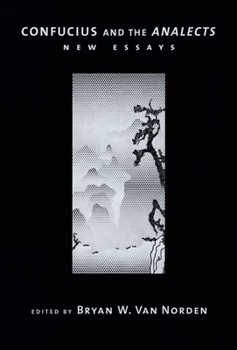Confucius and the Analects: New Essays
Select Format
Select Condition 
Book Overview
Confucius is one of the most influential figures--as historical individual and as symbol--in world history; and the Analects, the sayings attributed to Confucius and his disciples, is a classic of world literature. Nonetheless, how to understand both figure and text is constantly under dispute. Surprisingly, this volume is the first and only anthology on these topics in English. Here, contributors apply a variety of different methodologies (including...
Format:Paperback
Language:English
ISBN:019513396X
ISBN13:9780195133967
Release Date:January 2002
Publisher:Oxford University Press
Length:352 Pages
Weight:1.09 lbs.
Dimensions:0.9" x 6.2" x 9.3"
Customer Reviews
2 ratings
Great book. A "must read" for the Confucian student.
Published by Thriftbooks.com User , 21 years ago
A great collection of essays. I learned a lot. My favorite essays were: (2) Naturalness revisited: why westerners should study Confucius, (3) Ren and Li in the Analects, (4) "What does Heaven Say?", (6) Whose Confucious? Which Analects? (7) Confucius and the Analects in the Han, (9) Unweaving the "one thread" of the Analects 4:15, and (10) An existentialist reading of book 4 of the Analects. I highly recommend it. The other book reviewer asked rhetorically, "why does Confucius continute to be a source of fascination?" Confucius had a penetrating view of humanity. The book under review is a stimulating academic book, but it does not bring you in touch with the transforming power of Confucius's lessons. To appreciate the power of Confucian lessons to change lives I recommend the book by Robert Canright: "Achieve Lasting Happiness, Times Secrets to Transform Your Life."
Major revamp of what's to know in the Sage
Published by Thriftbooks.com User , 22 years ago
Confucius and the Analects is an important collect of studies on a pivotal figure in world civilization. Editor excerpt: Imagine a person who has an influenence on his native tradition comparable to the combined influence of Jesus and Socrates on the Western tradition. Such a person was Confucius.The similarities continue. Although all three were literate, perhaps all highly so, neither Confucius, nor Jesus, nor Socrates left behind any of his own writings. We know each only through the later writings of his admirers and detractors. In addition, each had a distinctive, charismatic, and complex personality. These three common features have made each the object of love, hatred, admiration, denigration, and debate for over two millennia.Though Confucius is referred to in a variety of early Chinese texts, one of our most important sources of information about him is the Analects, a collection of sayings, brief discussions, and observations by and about Confucius, his disciples, and his contemporaries. Despite its great importance, prior to this volume there has never been a collection of secondary essays in English on the Analects. This volume is a collection of essays on the Analects, and on Confucius as seen (primarily) in that classic.For the last two millennia, most scholars (whether Eastern or Western) have taken all twenty "books" of the Analects as an accurate record of what Confucius and his disciples have said. But scholarship in recent centuries has become more suspicious, investigating such issues as the historical composition of the text of the Analects and the sectarian motives behind various conceptions of Confucius. Consequently, the essays in this anthology are loosely grouped into two sections (based on an aphorism from Analects 2:11: "One who can keep warm the old, yet appreciate the new, is fit to be a teacher"). "Keeping Warm the Old" consists of essays that do not call into question the view that the received text of the Analects represents a coherent worldview. In contrast, the essays in "Appreciating the New" either call into question the integrity of the received text of the Analeces, or explore aspects of the image of Confucius that have been neglected by some of the dominant interpretive traditions.Why has Confucius been, and why does he continue to be, such a source of fascination? One easy answer is that he has been a symbol for a variety of different (and often contrasting) things: meritocracy, aristocracy, traditionalism, rationalism, aestheticism, "feudalism," secularism, wisdom, ignorance, Chinese culture, virtue, hypocrisy, and "the Orient." On this explanation, Confucius is almost a cipher that functions to mediate our interest in other ideas and institutions. This explanation is not completely inadequate. All of us, at our worst, reduce Confucius to the father figure we either love or love to hate. However, I am enough of a traditionalist to believe that there is something about genuine classics that draws us to the





